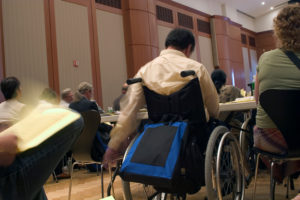The Virginia Supreme Court on October 31, 2014, issued a ruling that could significantly benefit plaintiffs who file wrongful death claims against corporations operating in the state. The decision came 10 years after the husband of the woman seeking to hold a Haymarket, VA-based lumber company accountable lost his life while attempting to drive across railroad tracks. The case revolved around whether the defendant corporation owed a duty to the deceased victim to resolve a situation that put his life at risk.
According to a brief Washington Post report on the fatal October 2004 crash, “Charles Settle, 52, of Warrenton was killed in Haymarket about 2:50 p.m. as he tried to drive his gravel-laden truck across the Norfolk Southern tracks east of Route 15.” The trucker’s widow filed a lawsuit, claiming that RGR, LLC negligently stacked its lumber in ways that blocked Settle’s view along the tracks. The grade-level private crossing did not have gates, warning lights or sirens to warn drivers of approaching trains.
Norfolk Southern settled a separate claim for $500,000, but the lumber company went to court. Its legal representatives argued that RGR could be found negligent because it had no legal obligation to ensure drivers could see oncoming trains. A circuit court jury rejected that defense and awarded the plaintiff $2.5 million. A fuller description of this litigation history appears in a blog posted by my Boston-based personal injury law colleague Jeffrey Glassman.
RGR believed that verdict was unfair and asked the Supreme Court in Richmond to review the facts, excuse it from paying a portion of the judgment equal to the amount already paid by the railroad and actually overturn the entire decision on the grounds that Settle had himself been negligent. As I’ve written elsewhere, Virginia’s laws on contributory negligence stack the civil justice system against plaintiffs. letting individuals and companies that injure or kill others avoid making financial compensation if they can convince a judge or jury that the victim made the slightest error.
Fortunately, the Virginia justices refused to give RGR that out. In the first Supreme Court opinion, the jury verdict was reversed. A petition for rehearing was filed, however. Later, in a fairly rare occurrence, a revised majority opinion was issued, which essentially changed the outcome. Two Supreme Court justices changed their vote, which ended up affirming the original jury verdict. On the rehearing, they became convinced that whether there was contributory negligence on the part of the driver who crossed the tracks was an issue for the jury to decide and that the jury had properly determined that there was no contributory negligence. The main conflicting evidence, then, was whether RGR had stacked lumber on it’s own property in a way that block the driver’s view and made him unable to act in a way that protected his life. The final determination was that Settle had only had two seconds to avoid the crash.
The full text of the Virginia Supreme Court’s decision in RGR, LLC v. Settle is available online.
EJL

Rick Shapiro has practiced personal injury law for over 30 years in Virginia, North Carolina, and throughout the Southeastern United States. He is a Board-Certified Civil Trial Advocate by the National Board of Trial Advocacy (ABA Accredited) and has litigated injury cases throughout the eastern United States, including wrongful death, trucking, faulty products, railroad, and medical negligence claims. During his three-decade career, Shapiro has won client appeals before the VA Supreme Court, VA Court of Appeals, NC Supreme Court, SC Supreme Court, WV Supreme Court, TN Supreme Court, and three times before the United States Court of Appeals for the Fourth Circuit, underscoring Shapiro’s trial achievements. In addition, he and his law firm have won settlements/verdicts in excess of $100 million. His success in and out of the courtroom is a big reason why he was named 2019 “Lawyer of the Year” in railroad law in U.S. News & World Report's Best Lawyers publication (Norfolk, VA area), and he has been named a “Best Lawyer” and “Super Lawyer” by those peer-reviewed organizations for multiple years. Rick was also named a “Leader in the Law, Class of 2022” by Virginia Lawyers Weekly (total of 33 statewide honorees consisting of lawyers and judges across Virginia). And in September 2023, Rick was selected as a recipient of the National Board of Trial Advocacy (NBTA) 2023 President’s Award. Although many nominations were submitted from across the country, Rick was just one of eight attorneys chosen by the prestigious National Board which certifies civil trial attorneys across the U.S. Rick was also recently named to Virginia Lawyers Weekly 2024 Virginia’s Go To Lawyers Medical Malpractice. The attorneys awarded this honor are nominated by their colleagues and chosen by a panel from the publication.










Comments for this article are closed.